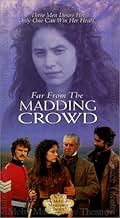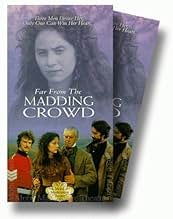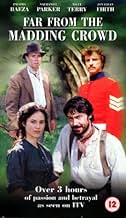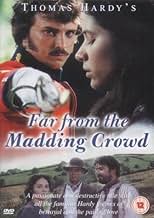Far from the Madding Crowd
- टीवी सीरीज़
- 1998
- 54 मि
IMDb रेटिंग
7.4/10
1 हज़ार
आपकी रेटिंग
अपनी भाषा में प्लॉट जोड़ेंA vain, pretty girl has recently taken over her uncle's farm. Her independent, naïve personality leaves her torn between the three men who wish to marry her.A vain, pretty girl has recently taken over her uncle's farm. Her independent, naïve personality leaves her torn between the three men who wish to marry her.A vain, pretty girl has recently taken over her uncle's farm. Her independent, naïve personality leaves her torn between the three men who wish to marry her.
- 1 BAFTA अवार्ड जीते गए
- 2 जीत और कुल 2 नामांकन
फ़ीचर्ड समीक्षाएं
This is a wonderful adaption of the great Thomas Hardy novel. Though the 1960's version (starring Julie Christie, Alan Bates,and Terrance Stamp) is gorgeous, this film is not so dated and the performances are in keeping with the original intent of the novelist. All the principles are strong but especially impressive is Nigel Terry's performance as doomed Mr. Boldwood whose love for Bathsheba drives him from hope and new-found happiness to despair and frenzy.
The locations are beautiful - almost another character in the story. The dialects of the locals may be difficult to understand at first but my ear learned to listen. The video version allows for playback of difficult to understand dialog.
Definately worth the 4 hour investment. It made me re-read the novel and enjoy it all over again.
The locations are beautiful - almost another character in the story. The dialects of the locals may be difficult to understand at first but my ear learned to listen. The video version allows for playback of difficult to understand dialog.
Definately worth the 4 hour investment. It made me re-read the novel and enjoy it all over again.
10reg-4
As a native of 'Hardy country', I feel I have a duty to comment on this production. I, as with many other people in England, eagerly awaited this series, and I have to say I was not disappointed. As us English have come to expect from our television dramas, the locations and costumes were fantastic, but this has the added bonus of an extremely accomplished screenplay. Also, the acting is superb. The accents, one of the major stumbling blocks to American acceptance, are accurate enough to satisfy English viewers (including those with the same accent!), while at the same time allowing American viewers to understand the dialogue. Particular praise should, I feel, go to Nathaniel Parker, who has achieved something very spectacular, in eclipsing Alan Bates' 1967 performance as the faithful shepherd Gabriel Oak. All in all, a feast of Wessex magic which can be enjoyed by all. Nice one.
I am a big fan of movies that follow the novel, and this version does not disappoint. It helps if one truly loves literature, as I do, but even so this story is incredible. The film makers did a wonderful job with this. It makes me want to move back to England when I watch it.
10Jen-49
I didn't think it was possible. I'd always loved the 1967 Julie Christie version with Alan Bates as the upright shephard Gabriel Oak. But having seen this version, then reading the book (amazingly readable) and re-watching the 1967 version, I definitely give my vote to Nathaniel Parker as my favorite Gabriel. (OK, so he's even cuter than Alan Bates circa 1967, so that part's a no-brainer!)
Seriously, comparing the two versions and the book (which is more Gabriel Oak's story), it is obvious how the Alan Bates part in the 1967 version was butchered to create more screentime for Terrance Stamp and Peter Finch as well as Julie Christie. It also became apparent to me that Julie Christie was too old for the part. Paloma Baeza is much more realistic (and likeable) as the headstrong, impetuous Bathsheba. I also liked the fact that there seemed to be more passion seething just beneath Gabriel Oak's surface veneer than in the 1967 version. The final scenes where she accepts his proposal and post-wedding are a lot more passionate (still without a single kiss, alas!) than the cool (dispassionate) ending of the 1967 version.
Seriously, comparing the two versions and the book (which is more Gabriel Oak's story), it is obvious how the Alan Bates part in the 1967 version was butchered to create more screentime for Terrance Stamp and Peter Finch as well as Julie Christie. It also became apparent to me that Julie Christie was too old for the part. Paloma Baeza is much more realistic (and likeable) as the headstrong, impetuous Bathsheba. I also liked the fact that there seemed to be more passion seething just beneath Gabriel Oak's surface veneer than in the 1967 version. The final scenes where she accepts his proposal and post-wedding are a lot more passionate (still without a single kiss, alas!) than the cool (dispassionate) ending of the 1967 version.
10Lady X
Having read this book more than once (it is my favorite Thomas Hardy book, and one of my favorite books of all time), and having seen both filmed versions, I have to say that the original version (with Alan Bates, Julie Christie and Peter Finch) cannot hold a candle to the second (with Nathaniel Parker, Paloma Baeza and Nigel Terry).
The original version was a great disappointment to me -- Julie Christie was, as another reviewer pointed out, too old for the part of Bathsheba, did not fit Hardy's description of her at all, and has never impressed me as much of an actress -- a major casting faux pas, in my opinion. Peter Finch, as Boldwood, did not elicit the strong feeling of empathy from me, as Nigel Terry did in his portrayal of the character. The greatest surprise to me, in regard to the first version, was that I also felt the same about Alan Bates' performance as Gabriel Oak -- he did not convey the emotions and the quality of Oak's character, as described by Hardy in the book, and I found his portrayal to be bland, boring, and, at times, overacted. Part of the blame would have to be shared by the director of that version -- the actors appeared to be acting, and neither they, nor the director, seemed to have a firm grasp or understanding of the explicit emotions and personalities of the characters, which Hardy had gone to great effort and detail to describe in the book.
After having seen Nathaniel Parker's interpretation of Gabriel Oak, I cannot imagine anyone else playing the part -- it was the first time I had seen Mr. Parker in any performance, and he ripped my heart out with his portrayal of this noble, dignified, aggrieved and tormented soul. He and Ms. Baeza, Mr. Terry, and Mr. Firth (Sergeant Troy), seemed to have a thorough comprehension of, and sensitivity toward, the characters as they were intended by Thomas Hardy -- they appeared to have walked straight out of the pages of the book! In addition, the sensitive and intuitive direction by Nicholas Renton drew powerful performances from all, including a superior supporting cast. The accurate period costumes, and beautiful sets and cinematography, serve to round out a production of true quality.
I highly recommend to anyone interested in this story, that he or she consider reading the book first. Although this screenplay remains true to the book, some of the detail which enhances understanding and feeling for the characters, the time period, and the plot, was edited due to time constraints, as is common with filmed productions of great pieces of literature.
The original version was a great disappointment to me -- Julie Christie was, as another reviewer pointed out, too old for the part of Bathsheba, did not fit Hardy's description of her at all, and has never impressed me as much of an actress -- a major casting faux pas, in my opinion. Peter Finch, as Boldwood, did not elicit the strong feeling of empathy from me, as Nigel Terry did in his portrayal of the character. The greatest surprise to me, in regard to the first version, was that I also felt the same about Alan Bates' performance as Gabriel Oak -- he did not convey the emotions and the quality of Oak's character, as described by Hardy in the book, and I found his portrayal to be bland, boring, and, at times, overacted. Part of the blame would have to be shared by the director of that version -- the actors appeared to be acting, and neither they, nor the director, seemed to have a firm grasp or understanding of the explicit emotions and personalities of the characters, which Hardy had gone to great effort and detail to describe in the book.
After having seen Nathaniel Parker's interpretation of Gabriel Oak, I cannot imagine anyone else playing the part -- it was the first time I had seen Mr. Parker in any performance, and he ripped my heart out with his portrayal of this noble, dignified, aggrieved and tormented soul. He and Ms. Baeza, Mr. Terry, and Mr. Firth (Sergeant Troy), seemed to have a thorough comprehension of, and sensitivity toward, the characters as they were intended by Thomas Hardy -- they appeared to have walked straight out of the pages of the book! In addition, the sensitive and intuitive direction by Nicholas Renton drew powerful performances from all, including a superior supporting cast. The accurate period costumes, and beautiful sets and cinematography, serve to round out a production of true quality.
I highly recommend to anyone interested in this story, that he or she consider reading the book first. Although this screenplay remains true to the book, some of the detail which enhances understanding and feeling for the characters, the time period, and the plot, was edited due to time constraints, as is common with filmed productions of great pieces of literature.
क्या आपको पता है
- ट्रिवियाFeatured playing period music is the Mellstock Band, which also appeared in Tess of the D'Urbervilles (1998).
- कनेक्शनVersion of Far from the Madding Crowd (1909)
- साउंडट्रैकGee-Ho! Dobbin!
Performed by Paloma Baeza
टॉप पसंद
रेटिंग देने के लिए साइन-इन करें और वैयक्तिकृत सुझावों के लिए वॉचलिस्ट करें
विवरण
इस पेज में योगदान दें
किसी बदलाव का सुझाव दें या अनुपलब्ध कॉन्टेंट जोड़ें






























